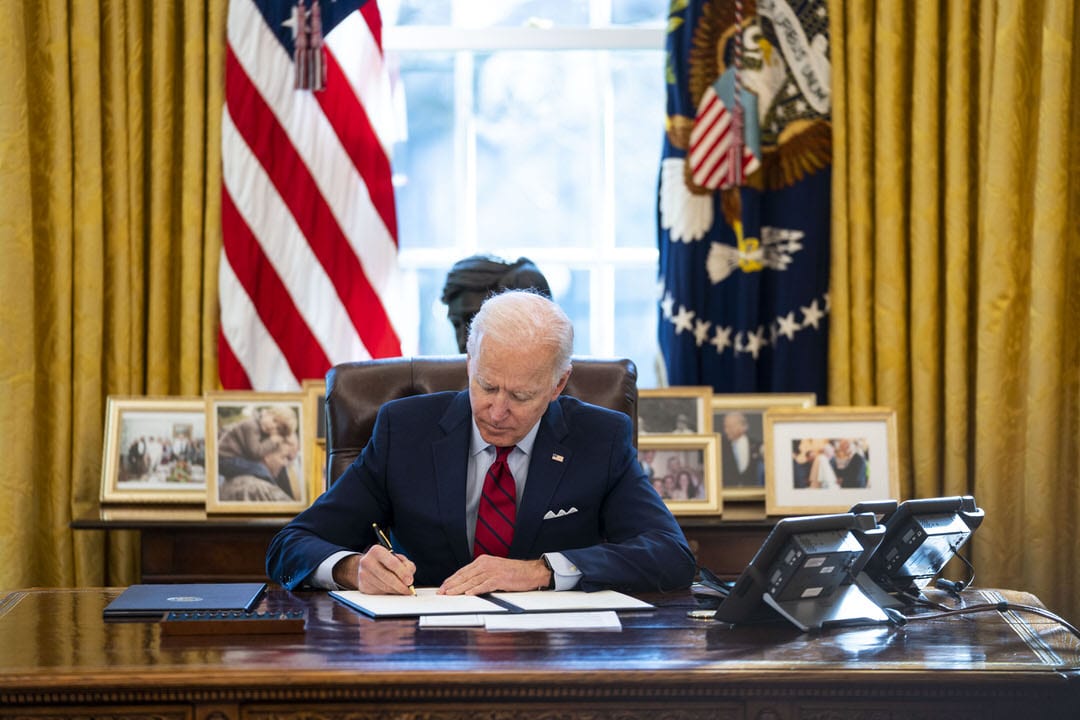In his first two weeks in office, President Joe Biden has signed 48 executive actions, including 28 executive orders. Presidents have historically used executive orders, memoranda and proclamations to direct the executive branch and implement policy. But Biden’s pen has been particularly active: He is on track to surpass Franklin Roosevelt, who signed a record 30 executive orders in his first month in office.
Many of Biden’s directives address long-standing issues that affect women, people of color and the LGBTQ+ community. The 19th has reported on some of the actions and what they mean for our readers.
Additional reporting by Sereena Henderson.
LGBTQ+ rights
The Trump administration’s ban on transgender people serving in the military wasn’t just a blow to LGBTQ+ rights: The order likely represented an unprecedented employment challenge for a community already facing staggering unemployment rates.
An estimated 13,763 of the military’s 14,700 trans service members faced dismissal under the ban.
- The military is the largest employer in the United States.
- Trans people are twice as likely to serve as the general population, according to the 2015 U.S. Transgender Survey.
- That same survey found that trans Americans are three times as likely to be unemployed as their cisgender peers.
On January 25, five days after his inauguration, Biden struck down the trans military ban via executive order, allowing all qualified service members to serve.
“America is stronger, at home and around the world, when it is inclusive. The military is no exception,” the White House said in a statement.
Racial equity
On January 26, six days after taking office, Biden framed addressing racial equity as an essential component of his effort to unite the country, saying that “our soul will be troubled as long as systemic racism is allowed to persist.” That day, he issued four executive actions to:
Address racial disparities in housing. Biden directed the Department of Housing and Urban Development to examine the Trump administration’s “regulatory actions that undermined fair housing policies and laws” and “to take steps necessary based on that analysis to fully implement the Fair Housing Act’s requirements.”
End the use of federal private prisons. Biden directed the next attorney general “not to renew Department of Justice contracts with privately operated criminal detention facilities.” Of the 122 federal prisons in the United States, only 11 are privately operated, and none of those house women. Still, advocates see the executive order as a step in the right direction to helping incarcerated women and LGBTQ+ people.
- More than 2 million people are incarcerated in the United States, and a disproportionate number of these individuals are people of color, according to the White House.
President Barack Obama made a similar promise to stop the use of private federal prisons at the end of his administration after a 2016 inspector general report found contracted prisons incurred more assaults and safety breaches than federally operated ones. President Donald Trump quickly reversed course; his Department of Justice in February 2017 committed to using private federal prisons.
Reestablish the government’s relationship with Native Americans. Biden said the administration would work toward “re-establishing federal respect for Tribal sovereignty, strengthening the Nation-to-Nation relationship between the federal government and American Indian and Alaska Native Tribes, empowering self-determination, and advancing racial justice for Native communities.”
“Respect for tribal sovereignty will be a cornerstone of our engaging with Native American communities,” Biden said in his signing remarks.
Combat xenophobia toward Asian Americans and Pacific Islanders. Racism and xenophobia toward Asian Americans and Pacific Islanders (AAPIs) has been exacerbated by the pandemic.
- Early in the pandemic, Trump’s focus on what he called the “China virus” had immediate impacts on the Asian American community.
- Stop AAPI (Asian American Pacific Islander) Hate, a national coalition, has documented more than 2,500 racial attacks against Asian people since March across 47 states and Washington, D.C.
- Women reported discrimination nearly two-and-a-half times more than men, from verbal attacks to physical assaults.
Biden signed a presidential memorandum “acknowledging the harm that these actions have caused,” and established that the administration’s policy “is to condemn and denounce anti-Asian bias and discrimination.”
Biden also directed the Department of Health and Human Services “to consider issuing guidance describing best practices to advance cultural competency, language access, and sensitivity” toward AAPIs in the federal government’s COVID-19 response, and for the Department of Justice to work with AAPI communities to prevent hate crimes and harassment.
Environment & climate
In three executive orders signed on January 27, Biden outlined an overarching climate agenda “to tackle the climate crisis at home and abroad.” His plans stateside include directives for federal agencies to craft programs and policies “to address the disproportionate health, environmental, economic, and climate impacts on disadvantaged communities” that are often near landfills, factories, ports, power plants and other infrastructure projects with deleterious environmental impacts.
- Asthma, for example, can be caused or made worse by environmental factors such as pollution. Black, Latinx and Indigenous people grapple with the long-term respiratory disease at disproportionate rates.
Biden’s administration will also double offshore wind energy production and pause all new oil and natural gas leases on non-tribal public lands and in public waters, as well as review all existing leases. The aim is to conserve at least 30 percent of the country’s lands and oceans by 2030.
- The executive orders do not restrict energy production on tribal lands. Biden said his Interior Department will work with Native American leaders to develop and manage sources of renewable energy.
- Biden has nominated Rep. Deb Haaland of New Mexico to head the department, which oversees 46 million acres of tribal land. If confirmed, Haaland, an enrolled member of the Laguna Pueblo tribe, will be the first Native American to hold a Cabinet-level position.
Natural Resources Defense Council President Mitch Bernard said Biden’s climate package will address decades of “environmental racism” because it “puts environmental justice and equity front and center.”
“For far too long, the low-income communities and people of color who’ve done the least to contribute to the climate crisis have been the very ones suffering the most,” Bernard said in a statement.
Health
Biden, who promised during his campaign to strengthen the Affordable Care Act and reverse abortion restrictions, signed two executive actions on January 28 that could largely impact women and LGBTQ+ individuals, who disproportionately lost access to health care during the Trump years. The actions included:
Strengthening Medicaid and the Affordable Care Act. This order directs the Department of Health and Human Services to open and heavily publicize a special enrollment period on the federally run Health Insurance Marketplace, from February 15 to May 15.
- The Trump administration cut efforts to advertise open enrollment periods.
- Women, who are more likely to cite cost as a barrier to having insurance, could benefit from a heavily publicized enrollment period for subsidized insurance. Transparency about the process could also be beneficial to transgender people, one in five of whom are uninsured.
The order also further directs federal agencies to look at many Trump-era policies that worked to undermine the Affordable Care Act, including rules loosening health insurance protections for people with preexisting conditions and Medicaid waivers that could have undercut the program’s benefits.
- Thirty percent of women have preexisting conditions, compared with 24 percent of men, according to the Kaiser Family Foundation.
- Medicaid is the biggest payer for pregnancy-related care in the United States and the biggest payer for mental health care — both issues that disproportionately affect women.
Tackling reproductive health at home and abroad. This memorandum was issued by Biden “to protect and expand access to comprehensive reproductive health care.”
It immediately rescinds the Mexico City policy, also known as the “global gag rule,” which prohibits foreign aid groups that get certain kinds of U.S. funding from “perform[ing] or actively promot[ing] abortion as a method of family planning.”
- Trump further expanded this policy to include all public health aid abroad, about $12 billion dollars, per the Guttmacher Institute, including money that addressed HIV treatment, pregnancy-related health, malaria, tuberculosis, water and sanitation, and child nutrition.
- Studies show that the implementation of the Mexico City policy was associated with a 13.5 percent reduction in the use of contraception and a 40 percent increase in the rate of abortion.
The memorandum also “directs the Department of Health and Human Services to take immediate action to consider whether to rescind regulations under its Title X family planning program.” Title X is the program that provides federal grants for family planning clinics, and aims to protect low-income people who disproportionately struggle to receive access to health care, including reproductive services.
- The Trump administration prohibited clinics from getting funding from Title X if they provided referrals for abortions, leaving out more than 400 Planned Parenthood affiliates.
- Many of these clinics provided a range of reproductive health services. The change cut Title X’s patient capacity by half, affecting 1.6 million patients, according to the Guttmacher Institute.
If implemented, Biden’s change could bring back those clinics that were barred. Reproductive rights advocates say that the change would emphasize what is generally considered to be best medical practices.
Immigration
As part of his promise to reform the immigration system, Biden signed three executive orders on February 2 that review and further roll back his predecessor’s policies, including one that would create a task force to reunite the remaining families who were separated at the border.
- The Trump administration’s “zero tolerance” policy separated thousands of immigrant children from their parents at the border.
- The American Civil Liberties Union, which sued the government over the policy, estimates the Trump administration separated at least 5,500 children from their parents from July 2017 to June 2018.
- One of the biggest challenges the task force faces is locating children. Limited information was documented by the Trump administration about their whereabouts.
- The order also “revokes the Trump Administration’s Executive Order that sought to justify separating children from their parents.”
“We’re going to work to undue the moral and national shame of the previous administration that literally — not figuratively — ripped children from the arms of their families, their mothers and fathers, at the border and with no plan to reunify the children who are still in custody and their parents,” Biden said, just before signing the orders.






